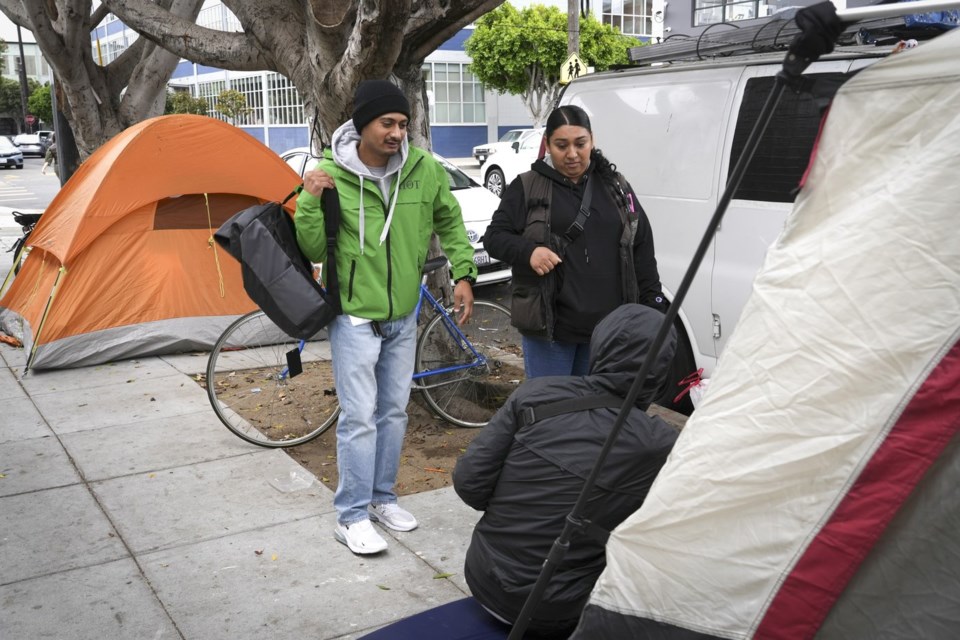SAN FRANCISCO (AP) ŌĆö Outreach worker Edgar Tapia hit a San Francisco neighborhood on a mission to find people to take eight available shelter beds, including a tiny cabin perfect for a couple.
He approached a in the Mission District, calling out greetings and offers of snacks and water bottles. He crouched to chat with tent occupants and asked if anyone was interested in moving indoors. He reminded them to clear the sidewalk.
ŌĆ£Do you have any more hygiene kits?ŌĆØ asked a woman inside an orange tent with five friends. ŌĆ£Can we get some socks?ŌĆØ
The job of Tapia and others on San FranciscoŌĆÖs Homeless Outreach Team is to match eligible people with vacant beds. But it's not a straightforward process as was clear on this September day, despite and a mayor who says she will living outdoors when they've been offered a place to stay.
Sometimes a person is eager to move inside, but there are no beds. Other times, a spot is open but the offer is rejected for a host of reasons, including complications with drugs and alcohol. Outreach workers plug away, reaching out and building trust with the people they call their clients.
ŌĆ£Today somebody wasnŌĆÖt ready because they were hanging out with their friends. TheyŌĆÖre not ready because they donŌĆÖt like the options that we have,ŌĆØ said Jose Torres, Homeless Outreach Team manager with the city's Department of Homelessness and Supportive Housing.
ŌĆ£Sometimes we get lucky and they accept the one thing we have available, and if that doesnŌĆÖt work out, we try something else," he said. ŌĆ£ItŌĆÖs that ŌĆśtry again, try againŌĆÖ system.ŌĆØ
Tapia, 34, was excited because a man heŌĆÖd been talking to for two months might be ready to accept a shelter spot. The first time they talked, Tapia said, the man asked no questions. But the next time, the man asked what the shelters were like.
ŌĆ£It just gives me the chills, because itŌĆÖs progress,ŌĆØ said Tapia. ŌĆ£I want to see these people off the streets. I want to see them do good.ŌĆØ
The woman inquiring after socks, who gave her name as Mellie M., 41, said her group wants hotel rooms or an apartment. She wants a place with locked doors and a private bathroom because she was raped while homeless.
ŌĆ£In order for us not to live in tents anymore," she said, ŌĆ£they need to give us a place that we can call home.ŌĆØ
Torres, the manager, left to check in with other outreach workers, thrilled because Tapia had found a couple for the tiny cabin. There was more good news when he arrived in the , where other outreach workers told him that a client, Larry James Bell, 71, was moving into his own studio apartment.
Ventrell Johnson got emotional thinking about the discouraged man he found living under a tarp eight months ago. Johnson eventually got Bell a bed in a homeless shelter, and now Bell was ready for his own bedroom and a shower he didn't have to share.
ŌĆ£IŌĆÖd like to have a house one day,ŌĆØ Bell said, sitting on a chair with a plate of eggs and sausage on his lap, a walking cane nearby.
Bell's departure means a free bed at the shelter. Johnson said he's noticed that people are a bit more likely to accept shelter now that the city is cracking down on encampments.
ŌĆ£They know that itŌĆÖs a little less tolerance,ŌĆØ he said. ŌĆ£ItŌĆÖs a little less leniency.ŌĆØ
By the end of the day, outreach workers had found seven people for seven shelter beds.
They returned to the Mission neighborhood encampment to tell the couple they could move into the tiny cabin. But when they got there, the couple had packed up and left.
Janie Har, The Associated Press



